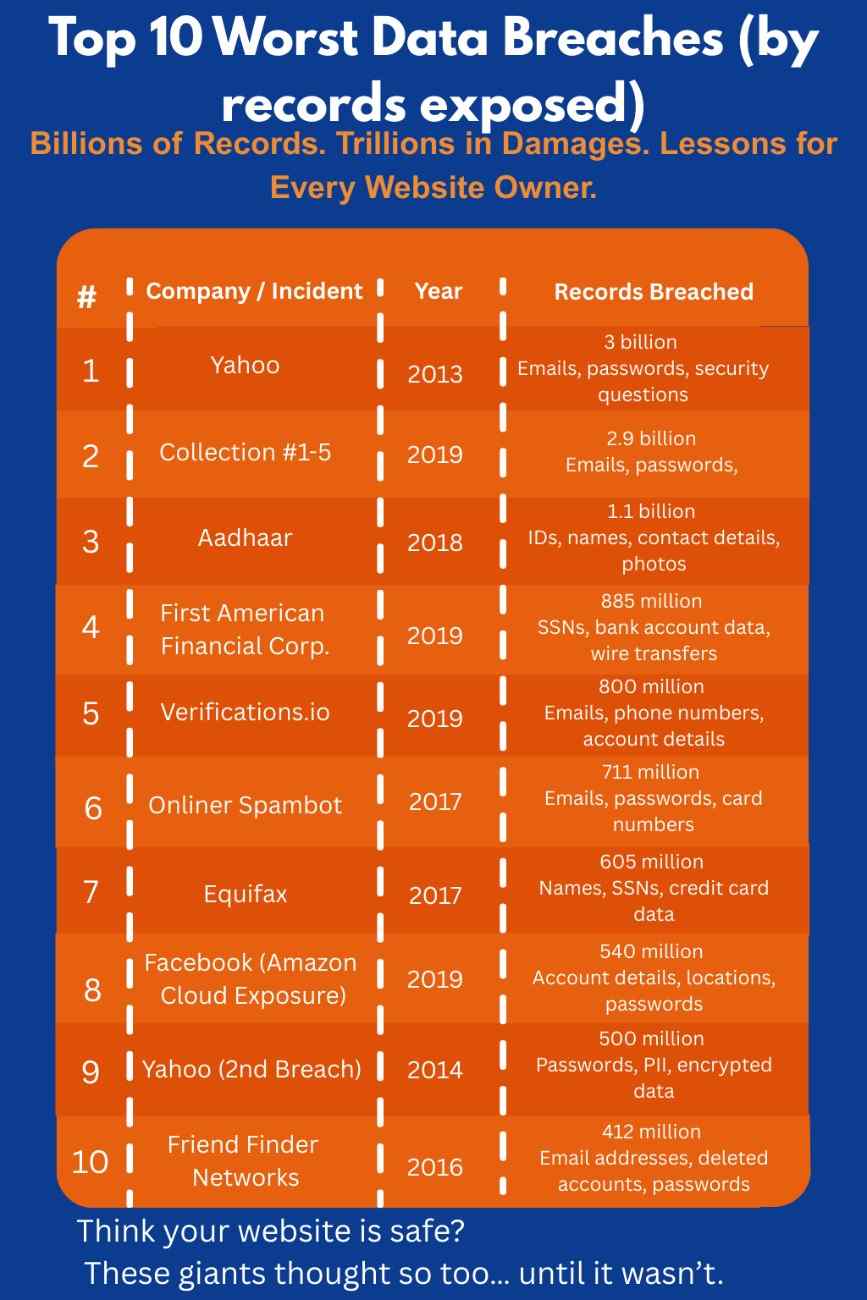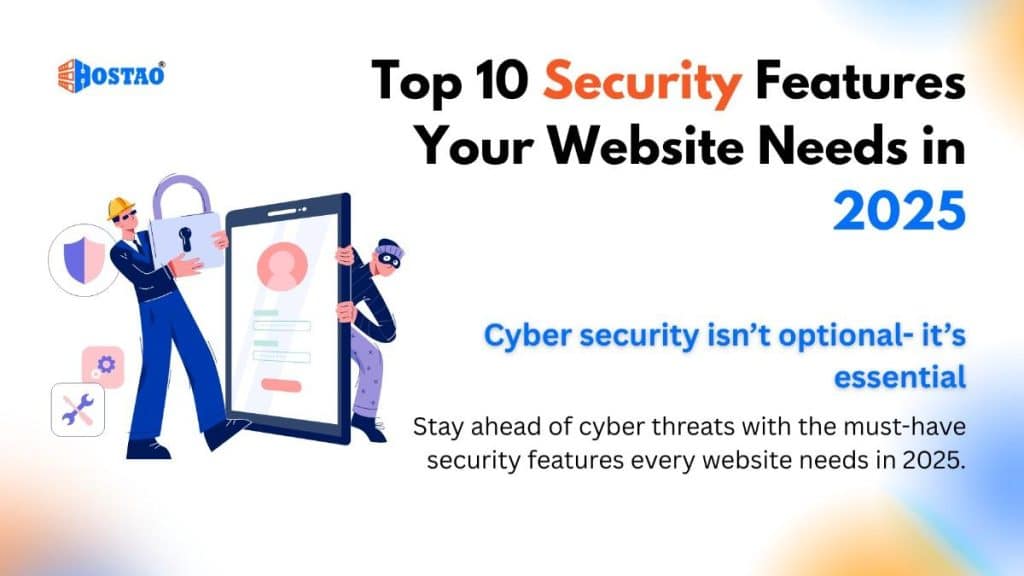Table of Contents
Cyber threats are evolving rapidly, making website security a necessity rather than an option in 2025.
A website is a crucial asset for any business. It acts as a digital storefront and primary touchpoint for customers to easily know and connect with your brand. However, as technology advances, so do the threatening cybersecurity issues. Hackers constantly find new ways to exploit vulnerabilities, putting businesses at risk through:
- Exposing confidential information such as customer details, financial records, and business secrets. (Sensitive data breaches)
- Locking critical data and demanding money for its release. (Ransomware attacks)
- Altering website content to damage credibility and trust. (Website defacement)
- Overloading servers with malicious traffic leading to downtime and financial losses. (Service disruptions)
Security breaches can further result in financial losses, legal consequences, and loss of customer trust, damaging a company’s reputation entirely beyond repair. Even a minor loophole can serve as an entry point for attackers, making adopting a proactive security strategy essential.
A good and futuristic security strategy with multiple layers of defense can safeguard your website from unnecessary invasions. From encrypting data transmissions to implementing real-time threat detection, businesses must adopt the latest security measures to address the evolving risks.
Here are ten key security features every website should have in 2025 to ensure robust protection against cyber threats.
1. Web Application Firewall (WAF)
A Web Application Firewall (WAF) acts as a protective barrier between your website and incoming traffic…
How It Works
- Monitors and filters traffic based on predefined security rules.
- Blocks harmful traffic from hackers, bots, and automated attacks by detecting malicious patterns.
- Prevents unauthorized access attempts and stops malware injections before they exploit vulnerabilities.
- Adapts to new threats with real-time security updates.
- Reduces the risk of data breaches by analyzing suspicious requests.
Why It’s Important
- Stops common threats like SQL injections, XSS, and cross-site scripting.
- Ensures that only legitimate users can interact with your website.
- Reduces server load by blocking bad traffic before it reaches your website.
- Safeguards website integrity and protects sensitive data.
- Enhances compliance with security standards (e.g., GDPR, PCI DSS).
- Minimizes downtime and financial risks caused by cyberattacks.
2. SSL/TLS Certificate
SSL (Secure Sockets Layer) and TLS (Transport Layer Security) encrypt data shared between your website and visitors…
How It Works
- Encrypts data before it is transmitted over the internet to prevent unauthorised access.
- Ensures that only the intended recipient can decrypt and read the information.
- Displays a padlock icon in the browser, showing that the website is secure.
- Authenticates the website’s identity to prevent phishing attacks.
- Establishes a secure HTTPS connection, protecting users from man-in-the-middle attacks.
- Uses encryption protocols like AES and RSA to safeguard data integrity.
Why It’s Important
- Prevents hackers from stealing login credentials and payment details.
- Builds trust with visitors by showing that their data is secure.
- Helps improve search engine rankings, as Google prioritizes HTTPS websites.
- Prevents browser warnings that discourage users from accessing non-secure sites.
- Strengthens overall cybersecurity by reducing vulnerabilities to cyber threats.
3. Regular Security Audits
A security audit is a routine checkup that helps identify weaknesses in your website’s security system…
How It Works
- Scans the website for outdated software, weak passwords, and potential security gaps.
- Identifies unauthorized access attempts, malware attacks, and suspicious activities.
- Provides recommendations to improve website security.
- Evaluates firewall settings, encryption protocols, and authentication mechanisms.
- Conducts penetration testing to simulate real-world cyberattacks.
Why It’s Important
- Detects security flaws and issues before hackers can exploit them.
- Helps maintain compliance with security regulations.
- Ensures that all security measures are up to date and effective.
- Protects user data, reducing the risk of breaches and financial losses.
- Enhances trust by demonstrating a proactive approach to cybersecurity.
4. Multi-Factor Authentication (MFA)
Multi-Factor Authentication (MFA) requires users to verify their identity using more than just a password…
How It Works
- Users enter their password as the first authentication step.
- A secondary verification step like a one-time code, biometric scan, or security key is required.
- Access is granted only after both steps are successfully completed.
- Some systems use adaptive MFA, adjusting security requirements based on user behavior and location.
Why It’s Important
- Protects admin accounts and sensitive data from unauthorized access.
- Reduces the risk of cyberattacks caused by weak or stolen passwords.
- Meets security compliance standards like GDPR and PCI DSS.
- Strengthens overall cybersecurity by adding an extra barrier against phishing and brute-force attacks.
5. Data Encryption
Data encryption converts information into an unreadable code that can only be read by authorized parties…
How It Works
- Uses encryption algorithms to scramble data before it is stored or transmitted.
- Only authorized users with the correct decryption key can access the information.
- Protects data both in transit and at rest.
- Employs strong encryption standards like AES and RSA for secure communication.
Why It’s Important
- Keeps customer and business data safe from hackers.
- Prevents identity theft, financial fraud, and data leaks.
- Ensures compliance with data protection laws like GDPR and HIPAA.
- Enhances trust by securing personal and financial information.
- Reduces the risk of data breaches, minimizing financial and reputational damage.

6. Automatic Backups
Automatic backups store a copy of your website’s data at regular intervals…
How It Works
- Backs up website files and databases on a scheduled basis.
- Stores copies in a secure location, either on offline servers or in cloud storage.
- Allows quick restoration to the latest stable version in case of data loss.
- Uses encryption to protect backup data from unauthorized access.
- Some systems offer incremental backups, storing only recent changes.
Why It’s Important
- Protects against accidental data deletion, system failures, and cyberattacks.
- Minimizes downtime by enabling fast website recovery.
- Ensures business continuity in case of an unexpected failure.
- Protects against ransomware attacks by allowing data recovery without paying a ransom.
- Helps meet compliance requirements for data retention and security.
7. Content Security Policy (CSP)
A Content Security Policy (CSP) prevents unauthorized scripts from running on your website…
How It Works
- Specifies which content sources are trusted and allowed to load.
- Blocks unauthorized scripts from executing in the browser.
- Prevents malicious code from being injected through third-party resources.
- Can be configured to report security violations for monitoring and analysis.
Why It’s Important
- Reduces the risk of harmful scripts running on your website.
- Protects users from phishing or malicious redirections.
- Prevents attackers from injecting malicious code to steal user data.
- Strengthens overall cybersecurity by limiting exposure to client-side attacks.
8. Captcha and Bot Protection
CAPTCHA prevents malicious bots from accessing your website…
How It Works
- Requires users to complete simple challenges like image selection or puzzles.
- Prevents automated scripts from submitting forms or logging into accounts.
- Uses behavioral analysis to differentiate between humans and bots.
- Can integrate with security systems to block suspicious IPs.
Why It’s Important
- Protects against spam and fake account registrations.
- Prevents brute-force attacks on login pages.
- Ensures real users can interact with your website.
- Helps safeguard online transactions and sensitive user data.
9. Regular Software Updates and Patching
Software updates and patches fix security flaws that hackers can exploit…
How It Works
- Fixes known vulnerabilities in website applications and plugins.
- Removes outdated or deprecated components.
- Automates patching processes in some systems.
Why It’s Important
- Reduces the risk of website breaches.
- Ensures that all security measures function correctly.
- Improves website performance and compatibility.
- Helps meet compliance requirements.
10. DDoS Protection
DDoS protection ensures that legitimate users can access your website while blocking malicious traffic…
How It Works
- Monitors incoming traffic to detect unusual patterns.
- Blocks malicious requests before they overwhelm the server.
- Uses load balancing to distribute traffic.
- Integrates with cloud-based services to neutralize large-scale attacks.
Why It’s Important
- Prevents downtime caused by high-volume attacks.
- Keeps websites accessible to genuine visitors.
- Protects business revenue by maintaining services.
- Reduces server strain and protects brand reputation.
Trivia
Pro Tip
Stack your defenses. Use firewalls, MFA, and encryption together for a strong, layered security strategy.
Conclusion
Website security should never be an afterthought. With cyber threats becoming more sophisticated, adopting these security features in 2025 will help keep your website safe. A secure website not only protects sensitive data but also builds trust with users and improves overall performance. By implementing these security measures, you can safeguard your website from threats and ensure smooth operations without interruptions.Ready to Secure Your Website in 2025?
Don’t leave your digital assets vulnerable to modern cyber threats. At Hostao, we provide robust website security solutions including SSL certificates, DDoS protection, automatic backups, malware scanning, and 24/7 monitoring— all designed to keep your website safe, fast, and always online.
👉 Explore Our Security Plans »FAQs
How can I ensure my website's compliance with data protection regulations like GDPR in 2025?
To ensure your website’s compliance with data protection regulations like GDPR in 2025:
- Use clear cookie consent banners.
- Collect only necessary user data.
- Provide easy options to access, modify, or delete personal data.
- Keep your privacy policy up to date.
- Use secure data storage and encryption.
- Work with GDPR-compliant tools and services.
Regularly audit your website to stay aligned with the latest legal updates.
What role does a Virtual Private Network (VPN) play in website security?
A VPN encrypts internet connections, protecting data transmitted between users and your website from interception and eavesdropping, especially over unsecured networks.
How can I stay updated on the latest cybersecurity threats and best practices?
Subscribe to cybersecurity newsletters, participate in relevant forums, attend webinars, and follow authoritative sources like the Cybersecurity and Infrastructure Security Agency (CISA) for the latest information.











